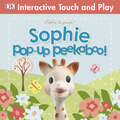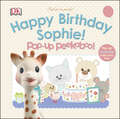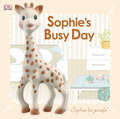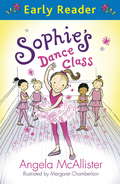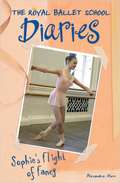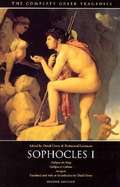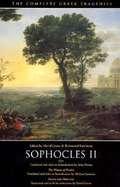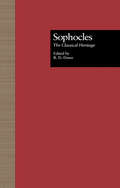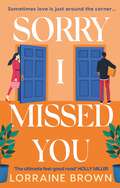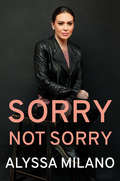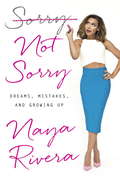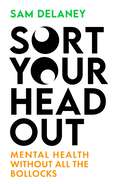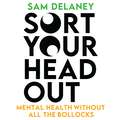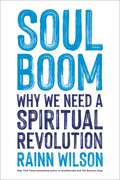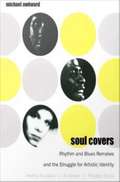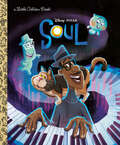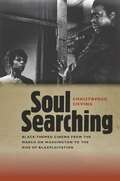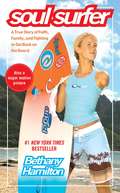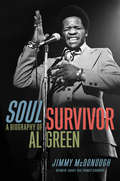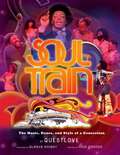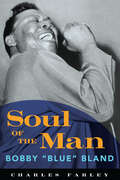- Table View
- List View
Sophia: Living and Loving
by A. E. HotchnerBiography of the famous actress Sophia Loren up to 1979.
Sophie la girafe: Pop-Up Peekaboo Sophie! (Sophie la Girafe)
by DKSophie: Pop-up Peekaboo! is a fun book for little ones who love the best-selling teether, Sophie the Giraffe. Babies and toddlers will enjoy playing peekaboo with Sophie and her friends in this DK picture book.
Sophie la girafe: Pop-Up Peekaboo! (Sophie la Girafe)
by DKYou're invited to Sophie's birthday party! Join Sophie and her friends Josephine, Gabin, Lazare, Margot, and Kiwi as they celebrate with balloons, cake, party hats, presents, and more! There are also peekaboo surprises to keep your little one's attention!
Sophie la girafe: Sophie's Busy Day (Sophie la Girafe)
by DKIntroducing a new series of eBooks for Sophie la girafe, the much-loved children's toy!Your baby will love exploring the world of adorable Sophie and her friends in this Sophie la girafe eBook, Sophie la girafe: Sophie's Busy Day. Join Sophie la girafe on her busy day as she cleans up her toys, picks apples, takes a trip to the store, and much more! Let young minds explore and imaginations develop as your baby follows Sophie la girafe and friends in this all-new adventure.Sophie la girafe: Sophie's Busy Day is perfect for reading together.
Sophie's Dance Class
by Angela McAllister Margaret ChamberlainEarly Readers are stepping stones from picture books to reading books. A blue Early Reader is perfect for sharing and reading together. A red Early Reader is the next step on your reading journey.Sophie loves to dance. She dreams of being a ballerina, and when she receives ballet lessons for her birthday, she hopes her wish to be a real dancer one day might really come true.
Sophie's Dance Class (Early Reader)
by Angela McAllisterEarly Readers are stepping stones from picture books to reading books. A blue Early Reader is perfect for sharing and reading together. A red Early Reader is the next step on your reading journey.Sophie loves to dance. She dreams of being a ballerina, and when she receives ballet lessons for her birthday, she hopes her wish to be a real dancer one day might really come true.
Sophie's Flight of Fancy (The Royal Ballet School Diaries, Book #4)
by Alexandra MossEllie and her friends rally to support Sophie, their fellow Royal Ballet School student who has failed her dance assessment and must decide what to do once she leaves at the end of the term.
Sophocles I: Oedipus The King, Oedipus at Colonus, Antigone (The Complete Greek Tragedies #8)
by Sophocles David Grene Richmond LattimoreIn nine paperback volumes, the Grene and Lattimore editions offer the most comprehensive selection of the Greek tragedies available in English. Over the years these authoritative, critically acclaimed editions have been the preferred choice of over three million readers for personal libraries and individual study as well as for classroom use.
Sophocles II: Ajax, The Women of Trachis, Electra, Philoctetes (The Complete Greek Tragedies #9)
by Sophocles David Grene Richmond LattimoreIn nine paperback volumes, the Grene and Lattimore editions offer the most comprehensive selection of the Greek tragedies available in English. Over the years these authoritative, critically acclaimed editions have been the preferred choice of over three million readers for personal libraries and individual study as well as for classroom use.
Sophocles' Antigone
by Diane J. RayorSophocles' Antigone comes alive in this new translation that will be useful for academic study and stage production. Diane Rayor's accurate yet accessible translation reflects the play's inherent theatricality. She provides an analytical introduction and comprehensive notes, and the edition includes an essay by director Karen Libman. Antigone begins after Oedipus and Jocasta's sons have killed each other in battle over the kingship. The new king, Kreon, decrees that the brother who attacked with a foreign army remain unburied and promises death to anyone who defies him. The play centers on Antigone's refusal to obey Kreon's law and Kreon's refusal to allow her brother's burial. Each acts on principle colored by gender, personality and family history. Antigone poses a conflict between passionate characters whose extreme stances leave no room for compromise. The highly charged struggle between the individual and the state has powerful implications for ethical and political situations today.
Sophocles: The Theban Plays (Cambridge Greek And Latin Classics Ser.)
by SophoclesLinked by their common setting in Thebes, Antigone, Oedipus the King, and Oedipus at Colonus stand at the fountainhead of world drama. This volume presents a new, and accurate yet poetic and playable translation by playwright Don Taylor, who has also directed plays for a BBC-TV production.
Sorry I Missed You: The utterly charming and uplifting romantic comedy you won't want to miss in 2022!
by Lorraine Brown'Fresh, modern, and totally charming, this is a romance-lover's dream!' LAURA JANE WILLIAMSRebecca isn't looking for love. She's perfectly happy with her high-flying city job, gorgeous flat overlooking Hampstead Heath and fortnightly fling with the hot CEO. She's certainly not interested in the hot actor neighbour who's just moved in opposite...Jack is still looking for his big break. It turns out being the star talent at drama school doesn't give you a golden ticket to Hollywood, after all. The last thing he needs is any distractions right now - especially not the uptight, power-suit wearing girl next door.They might live only a few metres away from each other but their worlds couldn't be further apart, plus opposites don't really attract... do they?Praise for Sorry I Missed You:'A gorgeous will-they won't-they love story, beautifully written and with characters so perfectly realised they feel like friends... it's the ultimate feel-good read' HOLLY MILLER'A perfect-for-these-times novel about friendship, connections and finding love where you least expect it' ZOE FOLBIGG 'A gorgeous, slow burning love story which had me tearing up at the end!' OLIVIA BEIRNE'A sweet, romantic story, full of heart' CAROLINE KHOURY
Sorry Not Sorry
by Alyssa MilanoAlyssa Milano&’s sharply observed, uproarious, and deeply intimate ode to the life she has lived and the issues that matter most. Alyssa Milano, actress and activist, delivers here a collection of powerful personal essays that get to the heart of her life, career, and all-out humanitarianism. These essays are unvarnished and elegant, funny and heartbreaking, and utterly real. A timely book that shows in almost real time the importance of taking care of others, it also gives a gut-punch-level wake-up call in an era where the noise is a distraction from what really needs to happen, if we want to live in a better world. These are stories of growing up in celebrity, of family and of friends, of connections and breaking apart. They have teeth on the page and come from the heart. And they are stories that offer a direct line into the thoughts and life of one of the most visible, hard-working humanitarians we have. A bestselling children's book author, Alyssa's finally giving her fans worldwide what they really want to hear directly from her about: the life she has lived, the things she's seen and experienced, and the way she lives in and with the world.
Sorry Not Sorry: Dreams, Mistakes, and Growing Up
by Naya RiveraFunny and deeply personal, Sorry Not Sorry recounts Glee star Naya Rivera's successes and missteps, urging young women to pursue their dreams and to refuse to let past mistakes define them.Navigating through youth and young adulthood isn't easy, and in Sorry Not Sorry, Naya Rivera shows us that we're not alone in the highs, lows, and in-betweens. Whether it's with love and dating, career and ambition, friends, or gossip, Naya inspires us to follow our own destiny and step over--or plod through--all the crap along the way. After her rise and fall from early childhood stardom, barely eking her way through high school, a brief stint as a Hooters waitress, going through thick and thin with her mom/manager, and resurrecting her acting career as Santana Lopez on Glee, Naya emerged from these experiences with some key life lessons:Sorry:- All those times I scrawled "I HATE MY MOM" in my journal. So many moms and teenage daughters don't get along--we just have to realize it's nothing personal on either side.- At-home highlights and DIY hair extensions. Some things are best left to the experts, and hair dye is one of them.- Falling in love with the idea of a person, instead of the actual person.Not Sorry:- That I don't always get along with everyone. Having people not like you is a risk you have to take to be real, and I'll take that over being fake any day.- Laughing at the gossip instead of getting upset by it.- Getting my financial disasters out of the way early--before I was married or had a family--so that the only credit score that I wrecked was my own.Even with a successful career and a family that she loves more than anything else, Naya says, "There's still a thirteen-year-old girl inside of me making detailed lists of how I can improve, who's never sure of my own self-worth." Sorry Not Sorry is for that thirteen-year-old in all of us.From the Hardcover edition.
Sort Your Head Out: Mental health without all the bollocks
by Sam Delaney'An honest, funny account of how we're all capable of changing for the better' SETH MEYERS'A great, motivating book that can really help - every bloke should read it' SHAUN RYDERSam Delaney was Jack the Lad. He was confident, loud and funny; an absolute legend, to be honest. Or at least that was what he pretended to be.But when he reached his thirties, work, relationships and fatherhood started to take their toll. Like so many blokes who seemed to be totally fine, he often felt like a complete failure whose life was out of control; anxiety and depression had secretly plagued him for years. Turning to drink and drugs only made things worse. Sam knew he needed help - the problem was that he thought self-help was for hippies, sobriety was for weirdos and therapy was for neurotics.Keeping it all inside was what nearly dragged Sam under. Then he began to open up and share his story with others. Soon his life started to get better and better. Now, he's written this book to help you do the same.Covering his complex upbringing, fast paced career, struggles with addiction and recovery, and detailing lessons he's learnt along the way, Sort Your Head Out is Sam's startlingly raw, compassionate and hilarious account of why opening up is the first step to sorting your head out.
Sort Your Head Out: Mental health without all the bollocks
by Sam Delaney'An honest, funny account of how we're all capable of changing for the better' SETH MEYERS'A great, motivating book that can really help - every bloke should read it' SHAUN RYDERSam Delaney was Jack the Lad. He was confident, loud and funny; an absolute legend, to be honest. Or at least that was what he pretended to be.But when he reached his thirties, work, relationships and fatherhood started to take their toll. Like so many blokes who seemed to be totally fine, he often felt like a complete failure whose life was out of control; anxiety and depression had secretly plagued him for years. Turning to drink and drugs only made things worse. Sam knew he needed help - the problem was that he thought self-help was for hippies, sobriety was for weirdos and therapy was for neurotics.Keeping it all inside was what nearly dragged Sam under. Then he began to open up and share his story with others. Soon his life started to get better and better. Now, he's written this book to help you do the same.Covering his complex upbringing, fast paced career, struggles with addiction and recovery, and detailing lessons he's learnt along the way, Sort Your Head Out is Sam's startlingly raw, compassionate and hilarious account of why opening up is the first step to sorting your head out.
Sort Your Head Out: Mental health without all the bollocks
by Sam Delaney'An honest, funny account of how we're all capable of changing for the better' SETH MEYERS'A great, motivating book that can really help - every bloke should read it' SHAUN RYDERSam Delaney was Jack the Lad. He was confident, loud and funny; an absolute legend, to be honest. Or at least that was what he pretended to be.But when he reached his thirties, work, relationships and fatherhood started to take their toll. Like so many blokes who seemed to be totally fine, he often felt like a complete failure whose life was out of control; anxiety and depression had secretly plagued him for years. Turning to drink and drugs only made things worse. Sam knew he needed help - the problem was that he thought self-help was for hippies, sobriety was for weirdos and therapy was for neurotics.Keeping it all inside was what nearly dragged Sam under. Then he began to open up and share his story with others. Soon his life started to get better and better. Now, he's written this book to help you do the same.Covering his complex upbringing, fast paced career, struggles with addiction and recovery, and detailing lessons he's learnt along the way, Sort Your Head Out is Sam's startlingly raw, compassionate and hilarious account of why opening up is the first step to sorting your head out.
Soul Boom: Why We Need a Spiritual Revolution
by Rainn WilsonIn this New York Times bestseller, comedic actor, producer, and writer Rainn Wilson explores the problem-solving benefits that spirituality gives us to create solutions for an increasingly challenging world. The trauma that our struggling species has experienced in recent years—because of both the pandemic and societal tensions that threaten to overwhelm us—is not going away anytime soon. Existing political and economic systems are not enough to bring the change that the world needs. In this book, Rainn Wilson explores the possibility and hope for a spiritual revolution, a &“Soul Boom,&” to find a healing transformation on both a personal and global level For Wilson, this is a serious and essential pursuit, but he brings great humor and his own unique perspective to the conversation. He feels that, culturally, we&’ve discounted spirituality—faith and the sacred—and we need profound healing and a unifying understanding of the world that the great spiritual traditions provide. Wilson&’s approach to spirituality—the non-physical, eternal aspects of ourselves—is relatable and applies to people of all beliefs, even the skeptics. Filled with genuine insight—not to mention enlightening Kung Fu and Star Trek references—Soul Boom delves into ancient wisdom to seek out practical, transformative answers to life&’s biggest questions.
Soul Covers: Rhythm and Blues Remakes and the Struggle for Artistic Identity
by Michael AwkwardSoul Covers is an engaging look at how three very different rhythm and blues performers--Aretha Franklin, Al Green, and Phoebe Snow--used cover songs to negotiate questions of artistic, racial, and personal authenticity. Through close readings of song lyrics and the performers' statements about their lives and work, the literary critic Michael Awkward traces how Franklin, Green, and Snow crafted their own musical identities partly by taking up songs associated with artists such as Dinah Washington, Hank Williams, Willie Nelson, George Gershwin, Billie Holiday, and the Supremes. Awkward sees Franklin's early album Unforgettable: A Tribute to Dinah Washington, released shortly after Washington's death in 1964, as an attempt by a struggling young singer to replace her idol as the acknowledged queen of the black female vocal tradition. He contends that Green's album Call Me (1973) reveals the performer's attempt to achieve formal coherence by uniting seemingly irreconcilable aspects of his personal history, including his career in popular music and his religious yearnings, as well as his sense of himself as both a cosmopolitan black artist and a forlorn country boy. Turning to Snow's album Second Childhood (1976), Awkward suggests that through covers of blues and soul songs, Snow, a white Jewish woman from New York, explored what it means for non-black enthusiasts to perform works considered by many to be black cultural productions. The only book-length examination of the role of remakes in American popular music, Soul Covers is itself a refreshing new take on the lives and work of three established soul artists.
Soul Little Golden Book (Little Golden Book)
by Golden BooksThis Little Golden Book is based on Disney/Pixar's Soul--streaming on Disney+ December 25, 2020!Ever wonder where your passion, your dreams, and your interests come from? What is it that makes you . . . YOU? In 2020, Pixar Animation Studios takes you on a journey from the streets of New York City to the cosmic realms to discover the answers to life's most important questions. Disney/Pixar Soul is directed by two-time Academy Award® winner Pete Docter (Up, Inside Out) and produced by Academy Award® nominee Dana Murray (Lou short). This Little Golden Book retelling is perfect for girls and boys ages 2 to 5, as well as Disney Little Golden Book collectors of all ages!
Soul Searching: Black-themed Cinema from the March on Washington to the Rise of Blaxploitation
by Christopher SievingThe sixties were a tremendously important time of transition for both civil rights activism and the U.S. film industry. Soul Searching examines a subject that, despite its significance to African American film history, has gone largely unexplored until now. By revisiting films produced between the march on Washington in 1963 and the dawn of the "blaxploitation" movie cycle in 1970, Christopher Sieving reveals how race relations influenced black-themed cinema before it was recognized as commercially viable by the major studios. The films that are central to this book--Gone Are the Days (1963), The Cool World (1964), The Confessions of Nat Turner (never produced), Uptight (1968), and The Landlord (1970)--are all ripe for reevaluation and newfound appreciation. Soul Searching is essential reading for anyone interested in the politics and cultural movements of the 1960s, cinematic trends like blaxploitation and the American "indie film" explosion, or black experience and its many facets.
Soul Surfer: A True Story of Faith, Family, and Fighting to Get Back on the Board
by Bethany Hamilton Sheryl Berk Rick BundschuhThe amazing story of the thirteen-year-old surfer girl who lost her arm in a shark attack but never lost her faith -- and of her triumphant return to competitive surfing. <P><P> They say Bethany Hamilton has saltwater in her veins. How else could one explain the tremendous passion that drives her to surf? How else could one explain that nothing -- not even the loss of her arm in a horrific shark attack -- could come between her and the waves? <P> That Halloween morning in Kauai, Hawaii -- a glorious part of the world, where it's hard to deny the divine -- Bethany responded to the shark's stealth attack with the calm of a girl with God on her side. Pushing pain and panic aside, she immediately began to paddle with one arm, focusing on a single thought: "Get to the beach...." Rushed to the hospital, where her father, Tom Hamilton, was about to undergo knee surgery, Bethany found herself taking his spot in the O.R. It's the kind of coincidence that isn't mere coincidence to the Hamilton family, a clan whose motto could easily be "the family that surfs and prays together stays together." To them it was a sign someone had a greater plan than the one they'd been working on themselves -- which had been to scrape together whatever resources they could to help Bethany rise to the top of her sport. When the first thing Bethany wanted to know after surgery was "When can I surf again?" it became clear that her unfaltering spirit and determination were part of a greater story -- a tale of courage and faith that this modest and soft-spoken girl would come to share with the world. <P> Soul Surfer is a moving account of Bethany's life as a young surfer, her recovery in the wake of the shark attack, the adjustments she's made to her unique surfing style, her unprecedented bid for a top showing in the World Surfing Championships, and, most fundamentally, her belief in God. It is a story of girl power and spiritual grit that shows that the body is no more essential to surfing -- perhaps even less so -- than the soul.
Soul Survivor: A Biography of Al Green
by Jimmy McdonoughThe bestselling author of Shakey: Neil Young's Biography presents the first in-depth biography of the legendary soul singer Al Green.Al Green has blessed listeners with some of the biggest hits of the past fifty years. "Love and Happiness," "I'm Still in Love with You," "Let's Get Married," and "I'm Tired of Being Alone" are but a sampling of the iconic songs that led a generation to embrace love in perhaps the most tumultuous period in this country's history, an unparalleled body of work that has many calling Green one of the greatest soul singers of all time. The music legend has sold over 20 million albums and been sampled by numerous rappers, and even President Obama has been known to sing a chorus or two. The now-Bishop Green is without a doubt one of the most beloved yet inscrutable figures ever to grace the popular music stage, and he has managed to magically sidestep being successfully scrutinized in print. Until now.Acclaimed journalist and author Jimmy McDonough expertly tackles this most elusive of subjects and aims to present readers with the definitive portrait of a man everyone knows but few understand. McDonough manages to break through Green's joyous veneer to reveal the contrary, tortured, and solitary individual beneath, a man who spent decades dancing an uneasy tightrope between the sacred and the profane. From his childhood in the backwaters of Arkansas to commanding the stage in front of throngs of lusting fans to addressing a very different audience from the pulpit of his own church, readers will bear witness to the creation of some of the most electrifying soul music ever recorded; learn the hitherto untold real story behind Green's colorful down-home Memphis label, Hi Records; and--by way of countless in-depth interviews with major players in the story, some speaking for the very first time--unravel one of the last great mysteries in popular music: Al Green.
Soul Train: The Music, Dance, and Style of a Generation
by Insight EditionsCelebrate the culture of cool with this compact, paperback edition of the heartfelt tribute to Soul Train, a worldwide phenomenon of dance, music, and fashion. From Ahmir "Questlove" Thompson of the award-winning hip-hop group the Roots, comes this vibrant book commemorating the legacy of Soul Train—the cultural phenomenon that launched the careers of artists such as Tina Turner, Stevie Wonder, the Jackson 5, Whitney Houston, Lenny Kravitz, LL Cool J, and Aretha Franklin. Questlove reveals the remarkable story of the captivating program, and his text is paired with more than 350 photographs of the show's most memorable episodes and the larger-than-life characters who defined it: the great host Don Cornelius, the extraordinary musicians, and the people who lived the phenomenon from the dance floor. The foreword by Gladys Knight and preface from Nick Cannon add heartfelt and unique perspectives on this seminal show. 35-YEAR HISTORY: A vibrant celebration of one of the longest-running nationally syndicated programs in American television history, which ran over 1,100 episodes. BEHIND THE SCENES: Includes first-hand commentaries about the show&’s impact on celebrity&’s careers and our culture from beloved artists such as Gladys Knight, Steve Wonder, Carmen Electra, B.B. King, Al Green, Nick Cannon, and Bill Withers. FILLED WITH PHOTOS: Contains hundreds of images of iconic moments from the show, including many never-before-seen.
Soul of the Man: Bobby "Blue" Bland (American Made Music Series)
by Charles FarleyBobby “Blue” Bland’s silky-smooth vocal style and captivating live performances helped propel the blues out of Delta juke joints and into urban clubs and upscale theaters. Until now, his story has never been told in a book-length biography. Soul of the Man: Bobby “Blue” Bland relates how Bland, along with longtime friend B. B. King, and other members of the loosely knit group who called themselves the Beale Streeters, forged a new electrified blues style in Memphis in the early 1950s. Combining elements of Delta blues, southern gospel, big-band jazz, and country and western music, Bland and the Beale Streeters were at the heart of a revolution. This biography traces Bland’s life and recording career, from his earliest work through his first big hit in 1957, “Farther Up the Road.” It goes on to tell the story of how Bland scored hit after hit, placing more than sixty songs on the R&B charts throughout the 1960s, ’70s, and ’80s. While more than two-thirds of his hits crossed over onto pop charts, Bland is surprisingly not widely known outside the African American community. Nevertheless, many of his recordings are standards, and he has created scores of hit albums such as his classic 1961 Two Steps from the Blues, widely considered one of the best blues albums of all time. Soul of the Man contains a select discography of the most significant recordings made by Bland, as well as a list of all his major awards. A four-time Grammy nominee, he received Lifetime Achievement Awards from the National Academy of Recording Arts and Sciences and the Blues Foundation, as well as the Rhythm & Blues Foundation’s Pioneer Award. He was also inducted into the Rock & Roll Hall of Fame and the Blues Foundation’s Hall of Fame. This biography at last heralds one of America’s great music makers.

